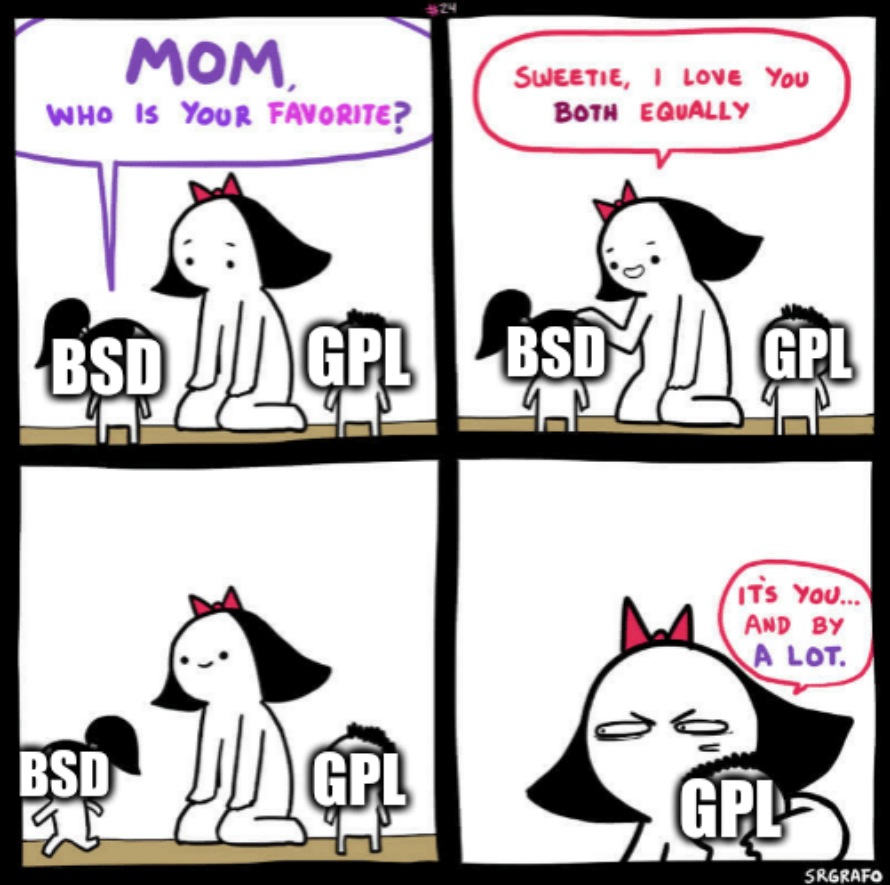I have spent the last 10 years of my career writing open source scientific software
linuxmemes
Hint: :q!
Sister communities:
- LemmyMemes: Memes
- LemmyShitpost: Anything and everything goes.
- RISA: Star Trek memes and shitposts
Community rules (click to expand)
1. Follow the site-wide rules
- Instance-wide TOS: https://legal.lemmy.world/tos/
- Lemmy code of conduct: https://join-lemmy.org/docs/code_of_conduct.html
2. Be civil
- Understand the difference between a joke and an insult.
- Do not harrass or attack members of the community for any reason.
- Leave remarks of "peasantry" to the PCMR community. If you dislike an OS/service/application, attack the thing you dislike, not the individuals who use it. Some people may not have a choice.
- Bigotry will not be tolerated.
- These rules are somewhat loosened when the subject is a public figure. Still, do not attack their person or incite harrassment.
3. Post Linux-related content
- Including Unix and BSD.
- Non-Linux content is acceptable as long as it makes a reference to Linux. For example, the poorly made mockery of
sudoin Windows. - No porn. Even if you watch it on a Linux machine.
4. No recent reposts
- Everybody uses Arch btw, can't quit Vim, and wants to interject for a moment. You can stop now.
Please report posts and comments that break these rules!
Personally I believe that the rights of users to privacy and freedom are more important then a corporations right to use open source software to make proprietary software. There's a reason why nobody uses FreeBSD and why Linux is the dominant open source operating system.
Hi. Nobody here. Do you know that if you own a PS5 or Nintendo Switch, you're a FreeBSD user?
Maybe we've got a different idea what it means to be a user.
The closest FreeBSD has to users is its proprietary derivatives, at this point FreeBSD might as well be considered proprietary.
At the moment large companies sponsor the development, without being forced to do so. And they allow developers to spend time on the project for free.
The foundation also makes sure that devs sign an agreement otherwise the code is not accepted.
So where is this all proprietary?
Because on Linux the vast majority of its users run a complete operating system under the GPL, meanwhile on FreeBSD the vast majority of people use a proprietary dirivitive. Also significantly more companies sponsor Linux and it's not even comparable.
If you think about how many people use proprietary Android by Google, it is exactly comparable.
Comparing numbers is pointless here. Fact is that GPL has more conditions when you're allowed to use and modify the code. More conditions means more restrictions. And this means, less freedom.
It means less freedom for developers but has proved that it provides more freedom for users. Does MacOS have an open source version? No but ChromeOS and Android do (ChromiumOS and ASOP respectively). Even when companies make a proprietary fork of Linux they still contribute massively in terms of code, not just money.
I don't get what you're trying to say here: the BSDs aren't private and secure?
I'm saying that when code is open source it helps the open source ecosystem and when using open source code means contributing your modifications everyone benefits.
The reason is not the license.
I read a story of someone that contributed to a BSD project, including fixes over some period of time, but later they ended up having to use a proprietary UNIX for work, that included their code, in a an intermediate, buggy state, but they were legally forbidden from applying their own bug fixes!
At the very least the GPL guarantees that if I am ever downstream of myself, I has fix my own damn mistakes and don't have to suffer them.
I am still willing to contribute to BSD stuff, but vastly prefer something like the AGPLv3.
